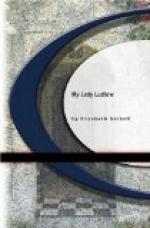an experiment, only it answered, as many of Mr. Gray’s
deeds of daring did. It was curious how he was
growing to be a kind of autocrat in the village; and
how unconscious he was of it. He was as shy
and awkward and nervous as ever in any affair that
was not of some moral consequence to him. But
as soon as he was convinced that a thing was right,
he “shut his eyes and ran and butted at it like
a ram,” as Captain James once expressed it, in
talking over something Mr. Gray had done. People
in the village said, “they never knew what the
parson would be at next;” or they might have
said, “where his reverence would next turn up.”
For I have heard of his marching right into the middle
of a set of poachers, gathered together for some desperate
midnight enterprise, or walking into a public-house
that lay just beyond the bounds of my lady’s
estate, and in that extra-parochial piece of ground
I named long ago, and which was considered the rendezvous
of all the ne’er-do-weel characters for miles
round, and where a parson and a constable were held
in much the same kind of esteem as unwelcome visitors.
And yet Mr. Gray had his long fits of depression,
in which he felt as if he were doing nothing, making
no way in his work, useless and unprofitable, and
better out of the world than in it. In comparison
with the work he had set himself to do, what he did
seemed to be nothing. I suppose it was constitutional,
those attacks of lowness of spirits which he had about
this time; perhaps a part of the nervousness which
made him always so awkward when he came to the Hall.
Even Mrs. Medlicott, who almost worshipped the ground
he trod on, as the saying is, owned that Mr. Gray
never entered one of my lady’s rooms without
knocking down something, and too often breaking it.
He would much sooner have faced a desperate poacher
than a young lady any day. At least so we thought.
I do not know how it was that it came to pass that
my lady became reconciled to Miss Galindo about this
time. Whether it was that her ladyship was weary
of the unspoken coolness with her old friend; or that
the specimens of delicate sewing and fine spinning
at the school had mollified her towards Miss Bessy;
but I was surprised to learn one day that Miss Galindo
and her young friend were coming that very evening
to tea at the Hall. This information was given
me by Mrs. Medlicott, as a message from my lady, who
further went on to desire that certain little preparations
should be made in her own private sitting-room, in
which the greater part of my days were spent.
From the nature of these preparations, I became quite
aware that my lady intended to do honour to her expected
visitors. Indeed, Lady Ludlow never forgave by
halves, as I have known some people do. Whoever
was coming as a visitor to my lady, peeress, or poor
nameless girl, there was a certain amount of preparation
required in order to do them fitting honour.
I do not mean to say that the preparation was of the




